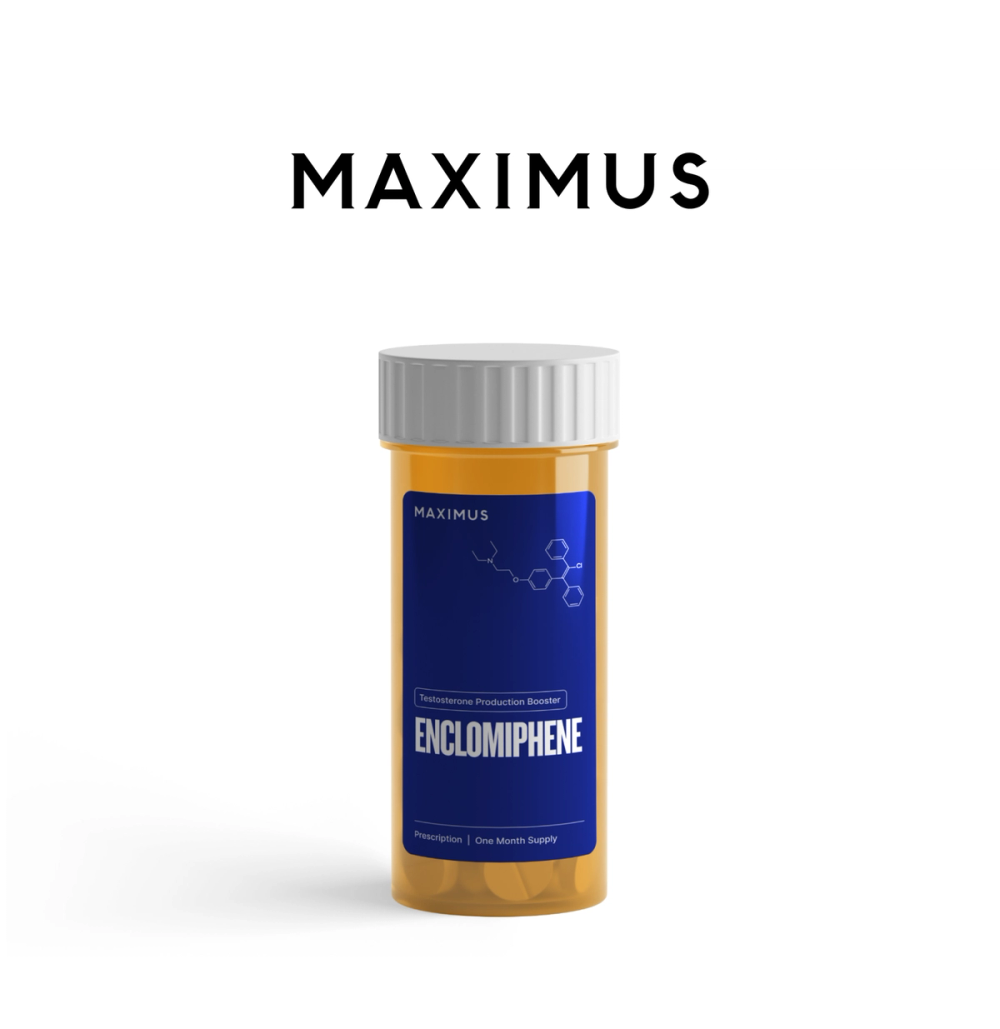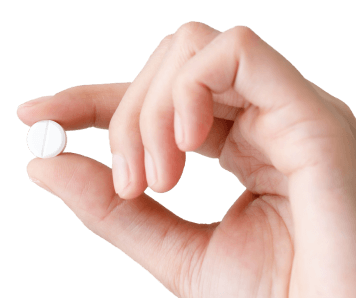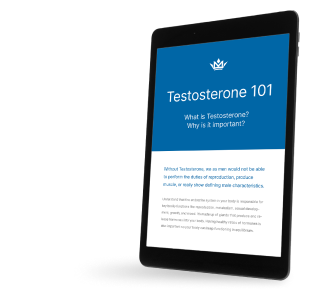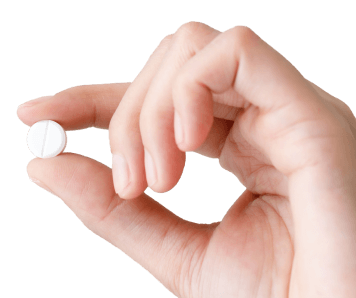Testosterone levels in men have been in a slow and consistent decline for several decades due to increasingly sedentary lifestyles, weight gain, and related health conditions. Clomiphene citrate, which goes by the name Clomid, is a fertility drug used off-label to help restore testosterone to normal levels.
Though the drug is considered a safe alternative to testosterone replacement therapy (TRT) and is associated with fewer side effects, there are drawbacks to using Clomid. This article will explain how the medication works, investigate the pros and cons of Clomid, and explore other ways you can raise your own testosterone levels.
Key takeaways:
- Clomiphene citrate, which goes by the name Clomid, is a fertility drug used off-label to help restore testosterone to normal levels.
- Pros of Clomid include: more testosterone, better sperm production, improved sexual function, and increased muscle mass.
- Cons of Clomid include: mood changes, sore breast tissue, blurry vision, weight gain, acne, upset stomach, and risk of cardiovascular events.
- An alternative to Clomid is enclomiphene, a purified isomer in clomiphene citrate, which helps to improve testosterone levels with fewer side effects.
What is Clomid?
Clomid is a prescription medication belonging to a class of drugs known as selective estrogen receptor modulators or SERMs. Approved by the FDA to treat ovarian dysfunction in women, the medication is commonly used off-label to raise testosterone levels in men and boost sperm production and motility.
Also known as clomiphene citrate or simply clomiphene, Clomid consists of two isomers: zuclomiphene and enclomiphene. While zuclomiphene increases estrogen production in the body, enclomiphene blocks it, leading to ovulation in women and testosterone synthesis in men.
How does Clomid affect men?
Many men are prescribed Clomid to reduce symptoms associated with low testosterone, such as decreased libido, erectile dysfunction, low sperm count, fatigue, and muscle loss.
The medication works by tricking the body into thinking it’s not getting enough estrogen, which stimulates the production of luteinizing hormone (LH) and follicle stimulating hormone (FSH) in the hypothalamus and pituitary gland in the brain. This starts a chain reaction leading to testosterone production and spermatogenesis. Unlike TRT, which replaces your body’s testosterone with a synthetic version of the hormone, Clomid restores your body’s ability to make its own. This helps to avoid testicular atrophy so your body won’t become reliant on exogenous testosterone.
The pros of taking Clomid
Clomid is considered a safer alternative to TRT for men who may still want to conceive. Research has shown TRT negatively impacts male fertility by shutting down the body’s natural production of testosterone and hindering sperm production. This study comparing Clomid to TRT shows that Clomid is superior in preserving intratesticular testosterone production and spermatogenesis while improving symptoms associated with low testosterone like erectile dysfunction, loss of bone mineral density, and high body mass index.
Here is more research on the benefits of taking Clomid to increase testosterone:
Better sperm production
This 2022 review found that treatment with clomiphene led to a “significant improvement” of sperm concentration compared with placebo and could be especially helpful for those struggling with unexplained infertility.
Treatment with Clomid could produce even better results when combined with antioxidant therapy. This study found clomiphene taken with vitamin E resulted in significantly increased pregnancy rates and improved sperm production.
But how quickly will it work? Research shows that patients can expect improved sperm production within about three months of using clomiphene due to an increase in bioavailable testosterone. But testosterone elevation can begin as quickly as just four weeks after starting treatment according to this research.
Increased sperm motility
Along with improved sperm production, there’s evidence that Clomid may also improve sperm motility, which refers to how sperm move. In the study cited above on combined clomiphene and antioxidant therapy, researchers noted that patients also experienced improved progressive sperm motility, which means the sperm were more likely to reach its destination (the egg).
And in this study comparing treatment with Clomid to no treatment, subjects experienced an increase in sperm concentration by about 5% and improved motility by about 4%.
Improved sexual function
In a study of 86 young and infertile patients (mean age of 29 years) over the course of 19 months, researchers found that clomiphene treatment resulted in an improvement in libido, as well as a more positive mood and enhanced physical performance.
Along with an improved libido, men taking clomiphene may also see an improvement in their erections. In this study of 178 men with secondary hypogonadism and erectile dysfunction, clomiphene improved sexual function in 75% of subjects over the course of four months. It was also observed that men with anxiety-related disorders responded better to normalization of testosterone.
Increased muscle mass
Some consider Clomid a performance-enhancing drug because it is commonly used (and abused) in sports to get ahead. This 2018 study of obese men with low testosterone showed that clomiphene treatment resulted in an improvement in muscle mass. Researchers also observed an improvement in erections.
The cons of taking Clomid
Despite the benefits of taking Clomid, the medication is also associated with a number of adverse side effects ranging from mood changes and sore breast tissue to weight gain and acne. Here is what the research says:
Mood changes
One of the most common side effects reported with Clomid is a negative effect on the mood. Reddit threads are littered with terms like “emotional rollercoaster” and “waves of anxiety” in addition to complaints of feeling more aggressive at times.
Further research shows that the medication is known to cause mood swings and depression, which are thought to occur because of its mixed estrogenic and antiestrogenic effects. The isomer zuclomiphene, which increases estrogen, is also known to have a longer half-life, which means it stays in the system longer than enclomiphene, which blocks estrogen. When enclomiphene leaves the system, the imbalance of the lingering zuclomiphene results in emotional dysregulation.
Sore breast tissue
Another potential side effect of taking Clomid is breast tenderness or soreness of the pectoral muscle. This is thought to occur because of increased estradiol levels.
Blurry vision
In clinical trials of Clomid, blurred vision occurred in 1.5% of people. Other visual symptoms that can occur include spots and flashing, usually at higher doses. Those taking Clomid are warned to use caution when driving or handling heavy machinery.
Weight gain
Despite the evidence showing Clomid’s potential for increasing muscle mass, some users have reported an increase in weight and abdominal discomfort while on the medication. Mild water retention may be a contributing factor and is likely temporary. It’s also worth noting that the increase in muscle mass may result in an increase in weight.
Acne
In this 2015 study, researchers found that three out of 10 patients developed facial acne with one having a moderate-severe form. A rash was also observed in one user.
Risk of cardiovascular events
Clomid is also associated with an increased risk for cardiovascular events like arrhythmia, chest pain, edema, hypertension, palpitation, phlebitis, pulmonary embolism, shortness of breath, tachycardia, and thrombophlebitis. The risk is even higher and more severe with clomiphene is “misuse[d]” as a performance-enhancing drug as shown in this study.
Safe Clomid alternatives
Despite the many pros of taking Clomid, the cons may deter you from taking this medication to boost your testosterone. Researchers have found that enclomiphene citrate, the dominant isomer in Clomid, can be taken to boost testosterone safely and with fewer side effects.
Enclomiphene
Research shows that enclomiphene, the purified isomer of Clomid, successfully raises LH and FSH levels without negatively impacting semen parameters in as little as 14 days. Without the estrogen-boosting properties of zuclomiphene, enclomiphene efficiently blocks estrogen to stimulate testosterone production without causing mood swings or increasing your risk of cardiovascular events. In fact, enclomiphene is generally well tolerated with minimal side effects, which include headache (in less than 4% of patients), nausea (less than 3%), and joint pain (less than 2%). The medication may also increase testicular size.
Like Clomid, enclomiphene can also boost sperm production. This 2013 study shows that enclomiphene citrate elevated sperm counts in seven out of seven men at three months and six out of six men at six months with sperm concentrations in the 75-334 × 10(6) /mL range.
Enclomiphene is safe enough to take whether you have low testosterone or you’re simply looking for an extra edge when it comes to sexual performance, athletics, muscle gains, and even better confidence. And when combined with lifestyle habits like improved nutrition, quality sleep, stress management, and a regular exercise routine, you can support your body’s natural testosterone production without needing to rely on synthetic testosterone or the drawbacks of taking Clomid.
Learn more about how enclomiphene impacts testosterone and find out how the Maximus Testosterone Protocol can help you achieve more testosterone safely.
Disclaimer: The contents of this article, including, but not limited to, text, graphics, images, and other information, is for information purposes only and does not constitute medical advice. The information contained herein is not a substitute for and should never be relied upon for professional medical advice. The content is not meant to be complete or exhaustive or to be applicable to any specific individual's medical condition. You should consult a licensed healthcare professional before starting any health protocol and seek the advice of your physician or other medical professional if you have questions or concerns about a medical condition. Always talk to your doctor about the risks and benefits of any treatment. Never disregard or delay seeking professional medical advice or treatment because of something you have read on this site. Maximus does not recommend, endorse, or make any representation about the efficacy, appropriateness, or suitability of any specific test, products, procedures, treatments, services, opinions, healthcare providers or other information contained herein. Maximus is not responsible for, nor will they bear any liability for, the content provided herein or any actions or outcomes resulting from or related to its use.








